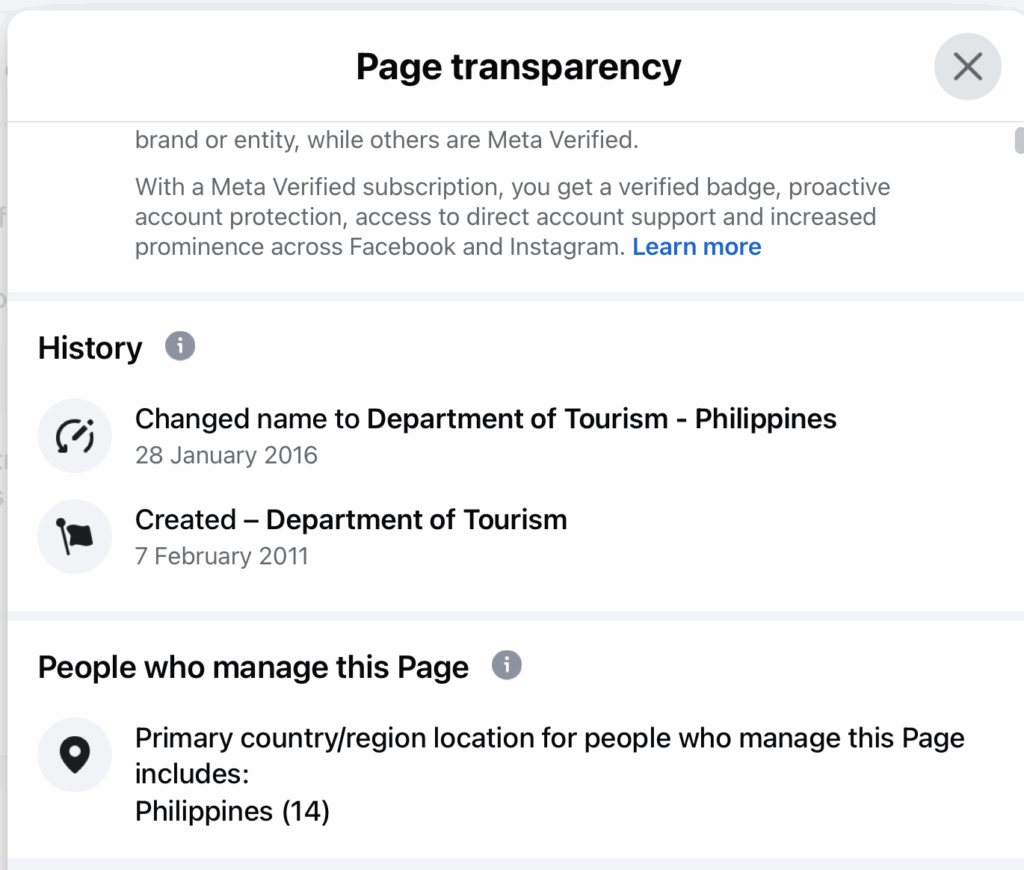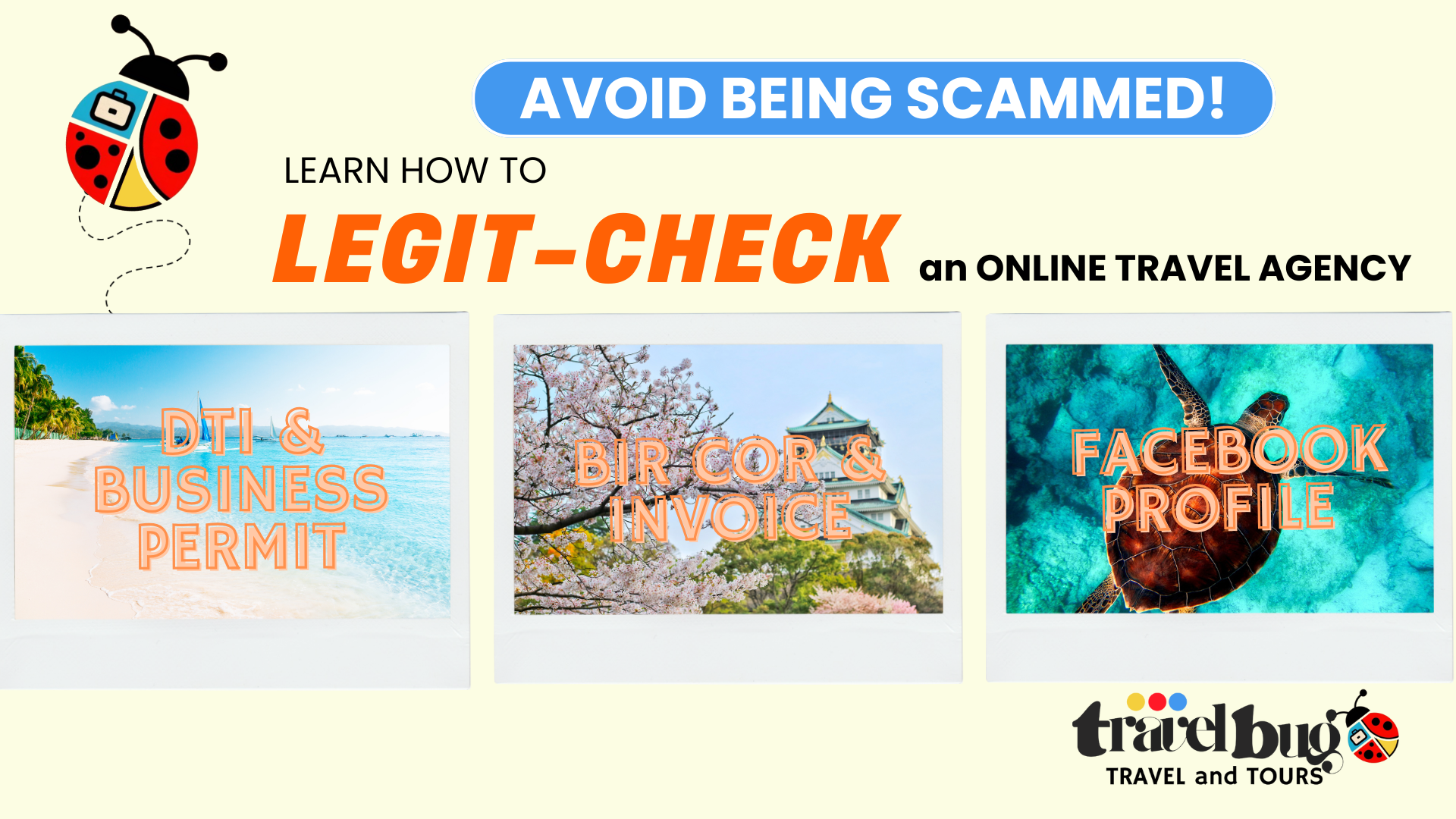When conducting any business transaction online, it’s crucial to do your due diligence and verify that the store, shop, outlet, or agency you’re dealing with is legitimate and trustworthy.
At Travel Bug Travel and Tours, we’ve received multiple inquiries from clients who, unfortunately, reached out only after being scammed by other so-called ‘agencies’.
One of the most recent cases we encountered involved a woman who planned to surprise her boyfriend in Dumaguete. Back in February, she contacted a travel agency she discovered on Facebook. Trusting their claims of being ‘legit,’ she transferred her hard-earned ₱5,000 for a 2Go Travel ticket. Sadly, she overlooked several red flags on the agency’s page—signs that it could be a scam. As soon as the payment was made to the scammer’s GCash account, she was immediately blocked by the page admin.
That’s when she found us. We took the time to guide her on how to assess a business’s legitimacy on Facebook and other social media platforms. Now, we’re sharing that same advice with you—practical tips on how to legit-check and spot fake travel or ticketing agencies—so you or someone you know won’t fall victim to the same scam.
Very important:
Before sending any payment, always do a background check. This simple step can save you from falling for a travel agency scam. Scammers are everywhere—on Facebook, TikTok, and Instagram—so you really need to filter out the fake ones. Kailangang salain nang mabuti para hindi mabiktima.
- Ask the agency for their DTI registration and then search for the name itself in the DTI website. Once you have the complete business name of the agency, go to DTI’s website and input / typed-in the name.
Official DTI website: https://bnrs.dti.gov.ph/search
If the agency is truly registered in DTI, the registration data and owner’s info will show up.
- Ask them for their Business Permit from their city or municipality.
The name and owner’s info should match with the info on DTI registration.
*There are some home-based travel agencies owners who refuses to register they’re businesses with the LGU.
- Next, ask for a copy of the BIR Certificate of Registration (COR)
You can see in the COR, the business name and the owner’s name. The info here should match with the DTI Certificate’s info.
- If they claim to be BIR-registered, ask them to show you an official Service Invoice, or Sales Invoice, or Acknowledgement receipt.
Why? This is because all registered businesses in BIR are required to have a BIR-approved invoice which will show the registered company name, the invoice control number, the owner’s name and address, plus owner’s TIN number. Previously, BIR requires official receipt, but beginning 2024 they now require “invoice”.
*Some scammers, through dubious means, will get ahold of the DTI and BIR COR of legit businesses and pretend that it is their own. But they will have a hard time coming up with the Service Invoice / Sales Invoice.
Make it even more secure, ask them to show Invoice No. 1, or 8, or any random numbers (1 or 2 digits).
If an invoice has been issued to a customer, they can just cover/hide the details part, for the privacy of their customer. The important thing to see in the invoice is the business name, owner’s name and address, sales/service invoice number, which matches the info on the BIR COR.
If someone is claiming to be legit and BIR-registered, but cannot show an official invoice – it’s a scam. Run away!
If they can show you an invoice – 85% the business is legit.
*Why it’s not 100% sure legit? Well, a business may have complete papers but the owners are still scammers. Example: They are duly registered in government entities, they will received your money, but will not process the ticket booking.
- The next one will be to assess their overall social media profile and postings. These are some things to watch out for:
Are they regularly updating their Facebook page? Are there interactions on their post? Do they disclose their contact information on their page? How many followers, subscribers, likers do they have? What about their customer’s reviews, can they be trusted?
Take note that it does not follow that if a page has a high number of followers and likers , that its automatically legit. Nope. Why not? Because likers and followers can be bought. And new businesses will naturally have few likers at the start. (Like us waaaa. Please Like and Follow us on Facebook! Thank you!)
You can also check the history of the name changes of the page. In Facebook, click the About section, next click “Page Transparency” and then click “Show All” and scroll down. You will see all the name changes of that page, if there are any. If the changes are suspicious, run away!
Example: This is the Facebook of the Department of Tourism Philippines. On the “Page Transparency” section, we can see that the page was created February 7, 2011 and at that time the original name was “Department of Tourism”. In January 28, 2016, the page name was changed to its current one.

This is unconventional, but in our case, if the client wants to see us, we gave our personal FB account. We request client to message us on our personal FB, then we will reply there. After they are satisfied, we bring back the conversation to our Travel Bug PH page, so all transaction records will be there. This is another way that we can reassure our clients that we are legit and trustworthy.
- Now, on the price. Ticket rates are one of the best indicators of a scam. If the rate is too good to be true, run away!
Example, back to the lady who inspired this post:
Our 2Go Manila to Dumaguete rate was P3,460 for a trip leaving 3 days away. Take note that we only added in P150 as our service fee. If the client pays us, we straightaway remit/pay the P3,310 to 2Go to be able to book the ticket, leaving us with P150 as profit.
She went ahead and booked with another agency, because for the same route and trip schedule, this agency only charged her P2,285. Our P3,360 versus their P2,285 seems high.
The result? Nawala ang P2,285 niya. Na-scammed sya again. Yes, twice sya na scam. She did not listen to us even after giving her tips. Saklap.
- Lastly, after doing all of the above suggestions, and you start interacting, chatting with the staff/owner, trust your gut. If something nags at you or doesn’t feel right, maybe it’s better to try another agency even if it means you will need to do a background investigation once again.
Hope this helps you!
BOOK YOUR TICKETS WITH TRAVEL BUG PH
Need help booking boat tickets like 2Go, Oceanjet, or TransAsia? Or maybe flights with Cebu Pacific, AirAsia, or PAL? We got you! Travel Bug Travel and Tours is legit—we can show you our DTI, BIR, LGU business permit. And we always issue a receipt after a successful transaction.
And hey, we don’t just book tickets—we’ll also help you score the best deals and lowest fares for your destination and travel date. Just shoot us a message on Facebook if you want to check rates or have any questions or you want to go for complete all-in travel packages. Thanks, and happy travels!





